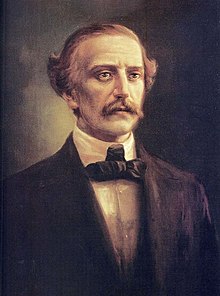
Back خوان بابلو دوارتي Arabic خوان بابلو دوارتى ARZ হুয়ান পাবলো দুয়ার্তে Bengali/Bangla Juan Pablo Duarte Catalan Juan Pablo Duarte German Juan Pablo Duarte Spanish Juan Pablo Duarte Basque خوان پابلو دوآرته Persian Juan Pablo Duarte French Juan Pablo Duarte Irish
This article may be too long to read and navigate comfortably. When this tag was added, its readable prose size was 12804 words. (May 2024) |
Juan Pablo Duarte | |
|---|---|
 Oil portrait of Juan Pablo Duarte by Dominican artist Abelardo Rodríguez Urdaneta. | |
| Born | January 26, 1813 |
| Died | July 15, 1876 (aged 63) |
| Resting place | Altar de la Patria |
| Nationality | Dominican |
| Occupations |
|
| Years active | 1833–1876 |
| Organization | La Trinitaria |
| Title | Father of the Nation |
| Political party | Central Government Junta |
| Parents |
|
| Relatives | Vicente Celestino (brother) Maria Josefa (sister) |
| Awards | National hero |
| Honours | Order of Merit of Duarte, Sánchez and Mella |
| Military career | |
| Allegiance | |
| Years of service | 1834–1876 |
| Rank | Brigadier General
|
| Battles/wars | Dominican War of Independence Dominican Restoration War |
| Signature | |
 | |
Juan Pablo Duarte y Díez (January 26, 1813 – July 15, 1876)[1] was a Dominican military leader, writer, activist, and nationalist politician who was the foremost of the founding fathers of the Dominican Republic and bears the title of Father of the Nation. As one of the most celebrated figures in Dominican history, Duarte is considered a folk hero and revolutionary visionary in the modern Dominican Republic, who along with military generals Ramón Matías Mella and Francisco del Rosario Sánchez, organized and promoted La Trinitaria, a secret society that eventually led to the Dominican revolt and independence from Haitian rule in 1844 and the start of the Dominican War of Independence.
Born into a middle-upper class family in 1813, his desire for knowledge and his dreams of improvement led him to Europe, where he strengthened his liberal ideas. These ideas formulated the outline for establishing an independent Dominican state. Upon returning, he voluntarily dedicated himself to teaching in the streets, improvising a school in his father's business, determined that the people of his era assimilate his ideals of revolutionary enlightenment.
Duarte became an officer in the National Guard and a year later in 1843 he participated in the "Reformist Revolution" against the dictatorship of Jean-Pierre Boyer of Haiti, which occupied Santo Domingo since over 20 years. After the defeat of the Haitians and the proclamation of the Dominican Republic in 1844, the Board formed to designate the first ruler of the nation and elected Duarte by a strong majority vote to preside over the nation but he declined the proposal, while Tomás Bobadilla took office instead.[2]
Duarte helped inspire and finance the Dominican War of Independence, paying a heavy toll which would eventually ruin him financially. Duarte also disagreed strongly with royalist and pro-annexation sectors in the nation, especially with the wealthy caudillo and military strongman Pedro Santana, who sought to rejoin the Spanish Empire. From these struggles, Santana emerged victorious while Duarte suffered in exile, despite coming back a few times, Duarte lived most of his remaining years in Venezuela until his death in 1876.
- ^ "Juan Pablo Duarte Biography". Biography.com. 2010. Archived from the original on 2010-09-11. Retrieved 2010-07-26.
- ^ "Biografia de Juan Pablo Duarte". Archived from the original on 2019-01-21.
© MMXXIII Rich X Search. We shall prevail. All rights reserved. Rich X Search